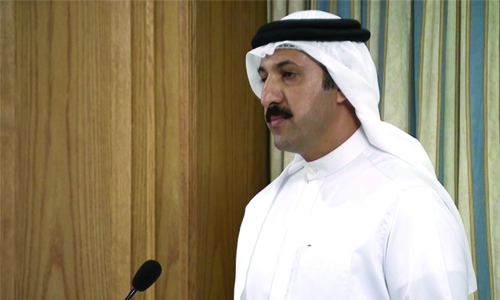Bahrain’s anti-terror funding strategy highlighted
The Undersecretary for International Affairs at the Ministry of Foreign Affairs, Dr Shaikh Abdulla bin Ahmed Al Khalifa, stressed that the Kingdom, under the leadership of His Majesty King Hamad bin Isa Al Khalifa, is making pioneering efforts to combat terrorism and its funding, as its adopts a comprehensive counter-terrorism strategy covering a wide range of dimensions, including economic growth, sustainable and human development, as well as the consolidation of coexistence and the strengthening of the rule of law in the framework of a constant and evolving reform process.
This came in the remarks delivered by Dr Shaikh Abdulla during the inauguration of the UNCCT National Capacity-Building Workshop for the Kingdom on Safeguarding the Non-Profit Sector from Terrorist Abuse, held at the Ministry of Foreign Affairs. The Undersecretary for International Affairs noted that this workshop is part of a series of workshops in which it is sought to create a common space and a qualitative partnership to build capacities and skills, exchange ideas and insights on best practices and means to strengthen efforts to counter the threat of terrorism and its funding and contribute to the protection of our sustainable security and our core values.
He also illustrated that if terrorism in all its forms constitutes one of the most serious threats to international peace and security, then money is what manifests terrorism. One of its main tributaries is the exploitation of NGOs, non-profit and charitable sectors along with other forms of crime, such as money laundering, drugs, arms trade, trafficking in persons and others. He added that despite the precautionary measures taken by most countries to dry up the sources of terrorist funding, terrorist organisations were often able to secure their financial needs illegally.
Dr Shaikh Abdulla pointed out how this is evident in the Middle East, especially with countries such as Iran and Qatar sponsoring armed terrorist organisations and pledging to establish, finance and harbour terrorists, noting the role of Iranian Future Bank, which funded terror operations to the tune of $ 9 billion. The Undersecretary for International Affairs showcased how the International community’s war against terrorism embarked in 1934, when the League of Nations discussed a draft convention for the prevention and punishment of terrorists.
In 1963, the United Nations created an international convention to counter terrorism, thus noting the end of the first millennium as crucial to the world in recognising the close link between the financing of terrorism and the survival and expansion of terrorist groups. The Financial Action Task Force (FATF) was also established in 1989 to implement legal measures to combat money laundering and terrorist financing, with the issue of drying up the sources of financing of terrorism as the main pillar of any counter-terrorism strategy.
Related Posts

